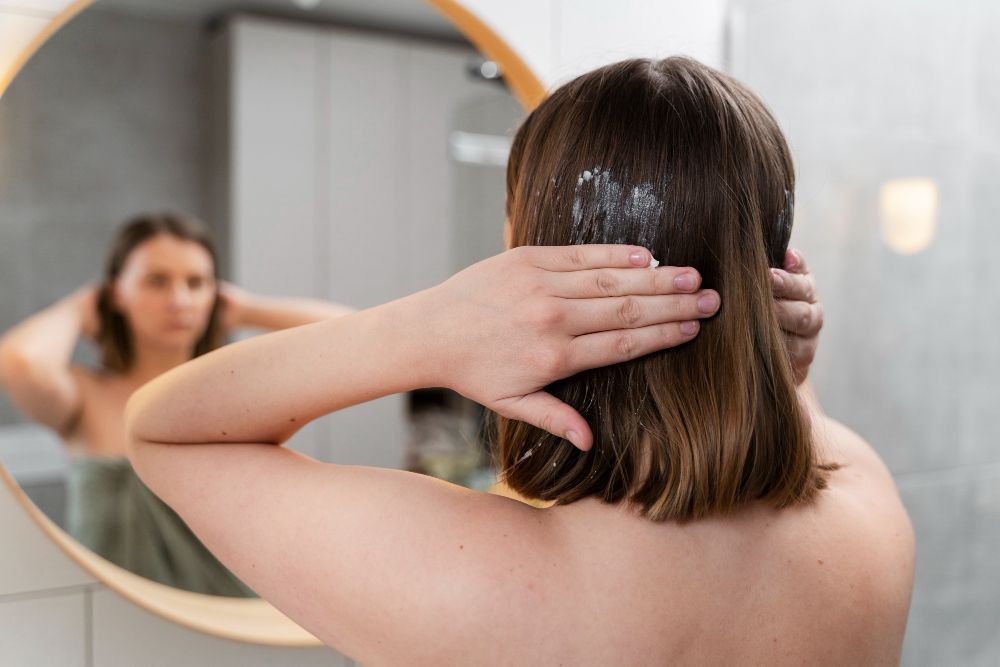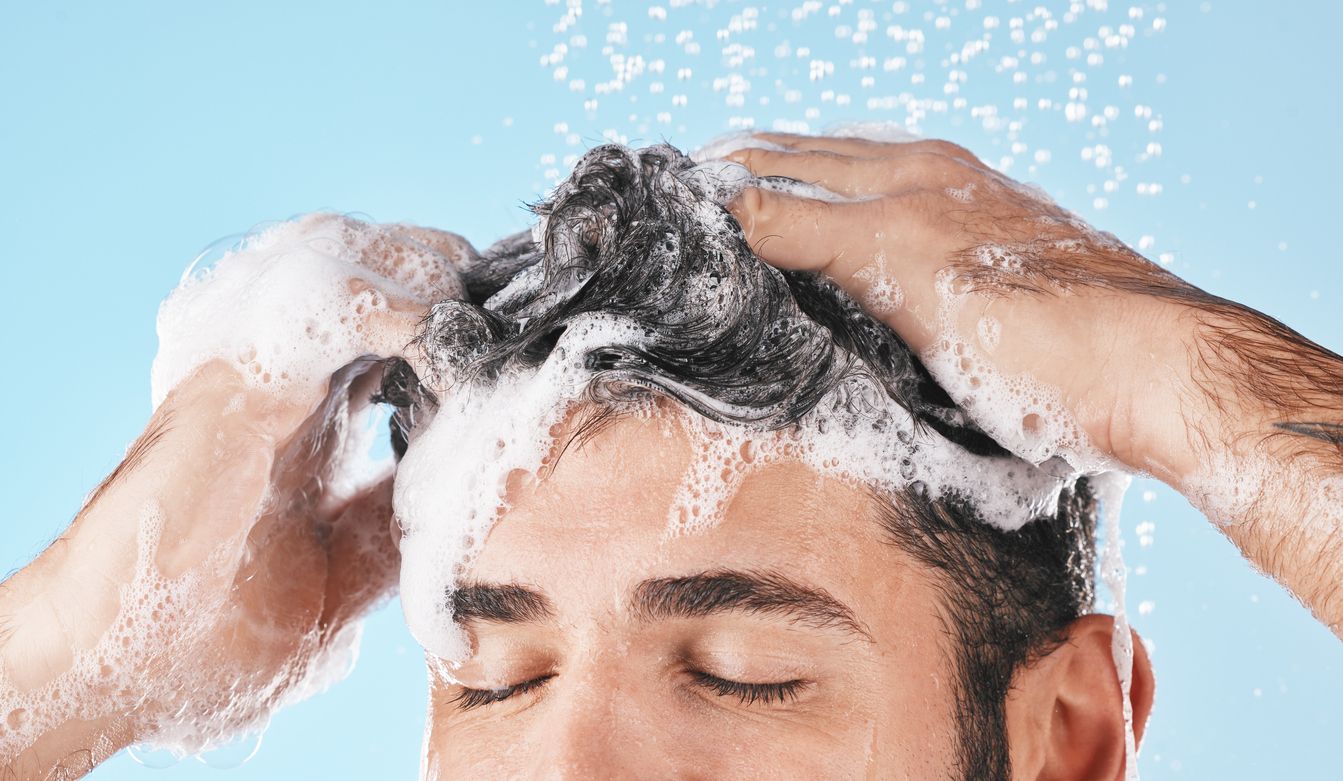
- Home
- Trend
- Weight Loss Strategies
- Acne Tips
- Hair Health Information
- Blemish Removal Tips
- Acne Scar Removal Tips
- Muscle Building Techniques
- Intimate Care Tips
- Postpartum Intimate Care
- Eye Bags Wiki
- Tips for Face Slimming
- Secret of Permanent Hair Removal
- Breast Enlargement Tips
- Cure to Snoring
- Marionette Lines
- Skin-Tightening Secrets
With Hong Kong’s humid and hot climate, it’s no surprise that oily skin becomes a daily struggle—and it’s not just your face that suffers. Your scalp is one of the hardest-hit areas. In the summer, it’s common for excess scalp oil to weigh down your hairstyle, cause itchiness, and even lead to an unpleasant greasy odor.
1. What Do Oil-Control Shampoos Actually Do? More Than Just Oil Removal

i. Oil Regulation
As the name suggests, oil-control shampoos help remove excess sebum from the scalp and rebalance oil production. These shampoos often provide deep cleansing, dissolving oil, sweat, and dirt trapped in your hair follicles. Many also contain botanical extracts like tea tree oil or rosemary to help regulate sebum levels and improve oily scalp conditions over time.
ii. Dandruff and Itch Relief
Many oil-control shampoos are also formulated to combat dandruff and relieve itchiness. Dandruff often stems from an overgrowth of Malassezia yeast on the scalp. Ingredients like ketoconazole, piroctone olamine, sulfur, or selenium found in these shampoos are effective antifungals that reduce yeast and soothe inflammation-related itchiness.
iii. Hair Loss Prevention
People with oily scalps often experience hair thinning or shedding. Excess oil mixes with dirt and clogs hair follicles, reducing follicle vitality and leading to hair loss. Oil-control shampoos help deep-clean the scalp and remove buildup, which can significantly reduce and prevent hair fall over time.
2. Common Ingredients in Oil-Control Shampoos

i. Cocamidopropyl Betaine
A mild surfactant derived from coconut oil, cocamidopropyl betaine helps cleanse oil and dirt while giving the shampoo a rich texture. It’s widely used in shampoos for oily scalps due to its effective cleansing power and low irritation potential, making it suitable for maintaining healthy hair.
ii. Sodium Lauryl Sulfate (SLS)
SLS is a strong cleanser commonly used in shampoos to boost oil-removal power. However, it’s known for being overly harsh—stripping not just excess oil, but also the scalp’s natural protective barrier and proteins. Studies show it may even interfere with healthy hair growth. It's best to avoid shampoos containing SLS if you have a sensitive or imbalanced scalp.
iii. Alcohol
Many shampoos include alcohol for its quick-drying and oil-dissolving properties. But high alcohol content can dry out hair and leave it looking frizzy and lifeless. Choose shampoos with low alcohol concentration to avoid damaging your hair texture.
iv. DEA/TEA (Diethanolamine/Triethanolamine)
These emulsifiers are sometimes added to enhance oil control. However, they are known irritants and may cause allergic reactions or inflammation. They can also disrupt the scalp’s natural keratin, making it dry and fragile. Health guidelines recommend keeping DEA under 0.5% and TEA under 2.5% in personal care products.
v. Parabens (e.g., Methylparaben)
Parabens are preservatives that prolong shelf life but are potentially harmful to scalp health. They may irritate the skin and weaken hair strands, increasing the risk of breakage.
免費體驗
F8 Hair Regrowth Treatment
1 Minute Self-Registration
Date should not be before minimal date
3. How to Choose the Right Oil-Control Shampoo
• Avoid harsh surfactants like Sodium Lauryl Sulfate, Sodium Laureth Sulfate, and Ammonium Lauryl Sulfate. While effective at cleansing, these can lead to over-cleansing and a rebound increase in oil production.
• Watch out for residue-prone ingredients like silicones. They form a film over the scalp and hair that can block follicles and interfere with the scalp's ability to "breathe", eventually causing irritation and buildup.
• Choose shampoos with natural essential oils such as peppermint, citrus, or green tea for fragrance. These not only smell refreshing but also help soothe and calm the scalp. Avoid synthetic fragrances, which often contain chemicals that may trigger sensitivity or allergic reactions with long-term use.
4. Top 7 Oil-Control Shampoos Loved by Netizens
i. Aveda Scalp Solutions Balancing Shampoo
This gentle formula features salicylic acid (from wintergreen) to exfoliate and unclog pores. It’s enriched with ginseng and certified organic turmeric to boost scalp circulation and combat hair loss. Babassu-derived cleansing agents help cleanse without breaking hair strands. Ideal for fine hair and oily or normal scalps.
ii. Ryo Hair Loss Care Shampoo (Green Bottle – Strong Oil Control)
Popular in Hong Kong, this Korean shampoo uses green tea, pine leaves, and peppermint for deep cleansing and oil control. Free from silicones, it’s designed to reduce dandruff, hair fall, and discomfort caused by an oily scalp.
iii. Natura Siberica Super Siberica Organic Mint Shampoo
Packed with vitamins and minerals, this shampoo hydrates and detoxifies the scalp. Iceland moss offers antimicrobial action, while zinc removes dandruff-causing buildup. Its minty formula helps restore balance for fuller, healthier hair.
iv. Botany Naturals Scalp Care Shampoo
Made with Australian botanical extracts and plant-derived foaming agents, this shampoo produces a rich lather that cleans deeply without stripping moisture. It also helps smooth frizz and leaves hair with a natural shine—great for stressed or irritated scalps.
v. L'Occitane Aromachologie Purifying Freshness Shampoo
Infused with willow herb and mint, this shampoo balances oil production and strengthens the scalp’s barrier. It purifies and soothes for refreshed, healthy-looking hair.
vi. Canvas Honeysuckle Shine & Balance Shampoo
Formulated with 96% natural ingredients, this gentle cleanser uses coconut-derived surfactants and honeysuckle extract to remove excess oil. Rosemary, lavender, chamomile, and jojoba oil nourish the hair, reduce dandruff, and prevent hair loss.
vii. OMG Scalp Care Shampoo
From a trusted Hong Kong salon brand, this shampoo features ginseng root and traditional Japanese herbs like Swertia. It rebalances oil, strengthens the scalp, and promotes follicle regeneration to combat thinning hair and boost volume.
5. Why Does My Scalp Get Oilier the More I Wash?
Many with oily scalps fall into the trap of over-washing with oil-control shampoos to feel “clean.” But this can strip away natural protective oils, sending your sebaceous glands into overdrive as they try to compensate.
This leads to a vicious cycle: the more you cleanse, the more oil your scalp produces. Over time, this can damage the scalp’s barrier, making it more sensitive to environmental stress and prone to irritation, dandruff, or even infection.
The key is moderation. Use gentle oil-control shampoos and avoid overwashing. Let your scalp rebalance itself gradually.
免費體驗
F8 Hair Regrowth Treatment
1 Minute Self-Registration
Date should not be before minimal date
6. Perfect Medical F8 Hair Regrowth Treatment: A Long-Term Oil Control Solution Without Side Effects
While shampoos can provide short-term relief, long-term oil control and scalp health require deeper intervention. That’s where Perfect Medical’s F8 Hair Regrowth Treatment comes in.
This non-invasive treatment uses low-level soft lasers to activate the scalp, stimulate blood flow, and restore oil balance. It also strengthens hair and reduces shedding.
The F8 treatment is paired with a world-class hair growth serum that hydrates the scalp and regulates oil production, creating an optimal environment for healthy hair growth.
Limited-Time Offer: Free trial of the F8 Hair Regrowth Treatment is now available. Click the link below to register!
Book a Trial: Perfect Medical F8 Hair Regrowth Treatment免費體驗
F8 Hair Regrowth Treatment
1 Minute Self-Registration
Date should not be before minimal date
FAQ

Can oil-control shampoos relieve scalp itch?
Yes. Many contain antifungal ingredients like ketoconazole, piroctone olamine, sulfur, or selenium to reduce Malassezia yeast, a common cause of scalp itch.
What ingredients are commonly found in oil-control shampoos?
These may include cocamidopropyl betaine, sodium lauryl sulfate, alcohol, DEA, TEA, and parabens.
Can people with dry or normal scalps use oil-control shampoos?
Oil-control shampoos are best for oily scalps. Dry or normal scalps may find them too harsh and risk over-cleansing.
What other ways can I reduce scalp oiliness?
Use the right shampoo, wash your scalp properly, eat less greasy food, and maintain scalp hygiene to manage oil production effectively.
What does Perfect Medical’s F8 Treatment do?
It helps reduce oiliness, balance the scalp’s ecosystem, and promote hair growth. It also addresses common scalp issues like dandruff and inflammation.








